Presentation Session: The most advanced Digital Transformation (DX) based on our Founder Ikeda-Sensei’s peace philosophy in AY2023
- Academics
- Graduate Schools
- The Graduate School of Economics:
- International Business Studies Program
- IBSP TOPICS
- Presentation Session: The most advanced Digital Transformation (DX) based on our Founder Ikeda-Sensei’s peace philosophy in AY2023
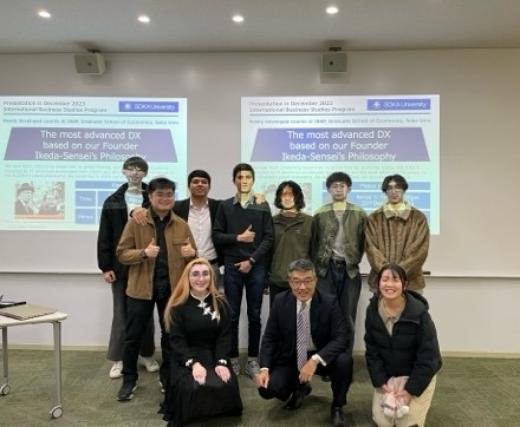
2024/01/17 09:48
Presentation Session: The most advanced Digital Transformation (DX) based on our Founder Ikeda-Sensei’s peace philosophy in AY2023
Soka University, Graduate School of Economics, International Business Studies Program (IBSP), has been conducting research on the most advanced Digital Transformation (DX) based on our Founder Ikeda-Sensei’s peace philosophy since last year 2022 as it was the 50th anniversary of Ikeda-Sensei and British historian Arnold Toynbee dialogue.
This research conducts historical review on the IT revolution that accelerated during and after the 1990's, and discovers our adaptive approach to the most advanced DX based on the Founder's peace philosophy.
The research team, master’s degree students of IBSP, Kelleher Marlena Cecilia ”Marci” from U.S.A., Chin Yen Yi “Alex” from Malaysia, Ruziboev Bobur ”Bob” Alisherovich from Uzbekistan, Adilbekov Azizbek Kamol Ugli from Uzbekistan and visiting professor of IBSP, Hideyuki Matsumoto Ph.D., presented their analysis of Ikeda-Sensei’s lectures delivered in overseas universities, historical review of the IT revolution during and after the 1990’s, discoveries regarding the most advanced DX (AI, Virtual Reality, Metaverse, Robotics, Cloud, and 5G) based on Ikeda-Sensei’s peace philosophy, and further research at Global Square, Student Performance Acceleration Center (SPACe), 2nd Floor on 22nd December 2023.
This research conducts historical review on the IT revolution that accelerated during and after the 1990's, and discovers our adaptive approach to the most advanced DX based on the Founder's peace philosophy.
The research team, master’s degree students of IBSP, Kelleher Marlena Cecilia ”Marci” from U.S.A., Chin Yen Yi “Alex” from Malaysia, Ruziboev Bobur ”Bob” Alisherovich from Uzbekistan, Adilbekov Azizbek Kamol Ugli from Uzbekistan and visiting professor of IBSP, Hideyuki Matsumoto Ph.D., presented their analysis of Ikeda-Sensei’s lectures delivered in overseas universities, historical review of the IT revolution during and after the 1990’s, discoveries regarding the most advanced DX (AI, Virtual Reality, Metaverse, Robotics, Cloud, and 5G) based on Ikeda-Sensei’s peace philosophy, and further research at Global Square, Student Performance Acceleration Center (SPACe), 2nd Floor on 22nd December 2023.
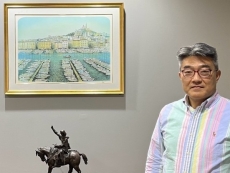
Dr. Hideyuki Matsumoto
At the beginning of the presentation, Dr. Matsumoto shared his experience when he conducted his research “Cross-Cultural Comparison of Global Strategic Information Systems Management in the Multinational Investment Banking Industry” at University of London, Birkbeck college, School of computer science and information systems. Dr. Matsumoto demonstrated various lectures delivered by Dr. Ikeda in overseas universities from 1974 to 2007. In addition, he shared Dr. Ikeda’s definition of globalization as disappearance of distance in reference to Toynbee dialogue. He empathized the importance of revisiting the philosophical concepts explained by Dr. Ikeda to interpretatively conduct social science research in order to create peaceful, valuable, and wealthy human society.
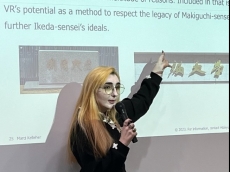
Kelleher Marlena Cecilia
Kelleher Marlena Cecilia ”Marci” firstly explained the reason why she selected Soka University. When she was searching for an international business graduate project, she wanted to ensure she selected a university that was peace and people-oriented, in defiance of the solely profit-driven mindset that dominates American business culture. She knew Soka University’s guiding principles of humanism and peace would allow for an education that provides a solid foundation for a “people first” type of business. She secondly shared her research topic selection: virtual reality (VR) and Ikeda-sensei’s 1996 speech “Makiguchi's Lifelong Pursuit of Justice and Humane Values”. In his speech, Ikeda-sensei uses the life of Makiguchi-sensei to discuss three key points of his philosophy: the importance of action, the power of education, and the creation of value. According to Ikeda-sensei, there are both active and passive forms of anger and tolerance; it is only through the active forms that we can effect meaningful change. Additionally, just as the negative forms of anger and hatred are taught by those who would do evil, righteous anger and active tolerance must be taught by us as part of our pursuit of peace, thus underscoring how essential education is. These efforts are all done with the goal of creating value; that is, actively contributing to society in ways that positively affect others and enhance the experience of life. And, as Ikeda-sensei shows, we can look to the life of Makiguchi-sensei to see the values of action, education, and value creation at work. VR is one such advanced technology that we must look at through the lens of Ikeda-sensei’s philosophy. VR is a simulated 3D environment that enables users to explore and interact with a virtual surrounding in a way that approximates reality, and it comes with a number of risks and benefits. VR can serve as a source of detachment, can be easily exploited, and can be inaccessible even in developed communities; on the other hand, VR can provide us with inspiration and can serve as an outlet for expression, can allow us to collaborate and can function as a platform for dialogue, and can be used as an educational tool. In conclusion, it is through Ikeda-sensei’s philosophy and the example set by Makiguchi-sensei that we can use technological advancements—such as VR—not only in a responsible manner, but also in a manner that acts as a force for good. Although there are risks to VR, Ikeda-sensei’s philosophy provides us with tools to navigate around those risks and instead focus on as well as promote the benefits.
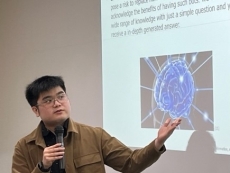
Chin Yen Yi
Chin Yen Yi “Alex” firstly mentioned that ever since he was a child, he had heard about Soka University from his parents and friends. When he had just finished his bachelor studies in Malaysia, he was encouraged to continue furthering his studies by a former student of Soka University and was inspired by Ikeda-sensei’s philosophy. He is grateful to have achieved his dream to attend Soka University. Second, he shared his research topic selection. Generative AI is capable of understanding and generating human-like responses based on the input it receives from its user. The development of such AI technology has heavily impacted the business environment, in areas such as strategy planning, operational process analyzing, online customer service, and many others where natural language conversation is usually required. He conducted his research on generative AI from the philosophical perspective of the founder Ikeda-Sensei’s lecture, “The Age of Soft Power and Inner-Motivated Philosophy: Toward a New US-Japan Relationship”, delivered in September of 1991 at Harvard University. He demonstrated the following discoveries. Generative AI brings forth the future where knowledge is no longer limited by geographical issues, language issues, and people are now living in the age of knowledge compiled by AI and of big data collected from the Internet (including books, websites, and written materials). He believes that the key to achieving peace in the age of “soft power”, as presented by Dr. Daisaku Ikeda, is the increasing of knowledge in all living individuals. Without knowledge, people are more likely to rely on “hard power”; the cultivation of knowledge is therefore very important to mankind. In conclusion, generative AI is one of the latest advance DX technologies developed in the modern era, and its potential for growth is almost indefinite as it can continuously feed on data inputted by developers.
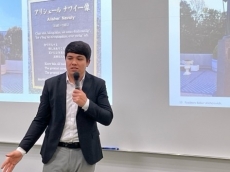
Ruziboev Bobur
Ruziboev Bobur ”Bob” Alisherovich firstly demonstrated, as to the reason why he selected Soka University, that he had been inspired by his fellow friends who studied here, and he would like to experience a supportive environment and learned from experienced professors in Soka University, aiming to enhance his global business skills. He secondly moved on to his research topic, Robotics, and demonstrated the structure of robots, comprising a central processing unit, sensors, actuators, power supply, and programming. Highlighting the benefits, he emphasized increased efficiency, improved safety, cost savings, and operational speed advantages. On the other hand, he also mentioned that there are disadvantages including job displacement, maintenance costs, high initial investment, lack of analytical ability, and concerns about dependence on technology. Transitioning to Dr. Daisaku Ikeda's lecture, “A new humanism for coming century”, given in New Delhi, India, in 1997, he introduced Ikeda-Sensei's thoughts on humanism and the centrality of humanity's power in shaping the future and he outlined the key topics covered in the lecture: New Humanism, the role of education, and the importance of peace in human civilization. As the main body of the presentation, he presented Ikeda sensei’s thoughts on new humanism, education, and the importance of peace. Reflecting on the 20th century as a period of regret due to global wars, he emphasized Ikeda-Sensei's point of view on peace as not merely the absence of conflict but the presence of positive and harmonious conditions. He emphasized that peace, as envisioned by Ikeda-Sensei, realizes human potential, drives cultural and educational progress, and fosters global unity. He concluded that Ikeda-Sensei believed that peace is essential for cultures to grow, and education can deliver a positive change.
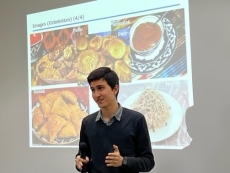
Adilbekov Azizbek Kamol Ugli
Adilbekov Azizbek Kamol Ugli firstly explained the reason why he selected Soka University. He was touched by the humanistic values introduced at Soka University and strongly believes that this valuable asset will assist him not only during his research process, but also during further life in discovering his whole potential. He secondly introduced his research topic selection. Cloud computing is a term used to describe globally distributed servers which allow to access data and applications from any internet-connected physical device. He explained the features, functions, and structures of cloud technology, and further mentioned the top 5 Cloud providers as well as each provider’s share of the market. Despite cloud technology’s accessibility, cost efficiency, collaborative features, and sustainability benefits, it still has problems with regards to data security, its strong reliance on a functional internet connection, various technical issues, and potential losses of control. He investigated cloud technology from the philosophical perspective of the founder Ikeda sensei’s lecture, "Thoughts on Education for Global Citizenship", delivered in June of 1996 at Teachers College, Columbia University, New York, USA. According to Ikeda-sensei, it is through education and local communities the global citizens are fostered. In addition, he emphasized that cloud technology can be used to reinforce the peace philosophy described by Ikeda sensei, especially in the field of education. As a database for great amount of information, it can be implemented at various educational facilities to ease and speed up the process of education. Additionally, its status as a platform for people who hold different views allows for a bridging of cultures that can provide a great source for the development of the elements (wisdom, courage, compassion) necessary for global citizenship. In conclusion, he stated that the philosophical concepts expressed by Ikeda-sensei can be viewed as universal in any of its applications and as a foundation for furthering the education of global citizenship, and these concepts can be seen particularly when applied to the subject of cloud technology.
ページ公開日:2024/01/17 09:48